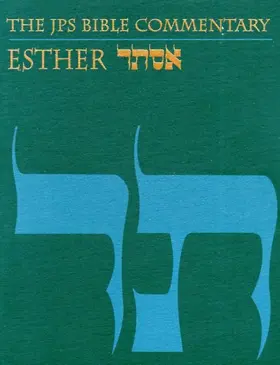

Esther
Pages
110
Publisher
Jewish Publication Society of America
Published
1/1/2001
ISBN-13
9780827606999
Collections
This book appears in the following featured collections.
- Recommended OT Commentaries by Denver Seminary Journal
- Tremper Longman's 5-Star Commentaries by Tremper Longman III
- Favorite Advanced OT Commentaries by Jeremy Pierce (parableman)
- Best Advanced OT Commentaries by Jason Gile
- Commentaries by Female Scholars by John Dyer
- Top Old Testament Commentaries by Engaging Scripture (Nijay Gupta's Substack)
- Commentaries by Jewish Scholars by Matt Quintana
- TGC: Scholarly Commentaries by The Gospel Coalition
Reviews
Written with an engaging and lively tone, Berlin’s commentary brings Esther into conversation with Hebrew literary themes and tendencies. Her interpretations are not always evangelical but they are nonetheless thought-provoking and well-studied.
[Full Review]
Overall, then, this is a beautifully produced, extremely readable, and surprisingly accessible commentary on the book of Esther. Written from a Jewish perspective, both the format and content confront the Christian reader with the reality of this Old Testament story, both in terms of it's meaning, and interpretation through the centuries. Whilst it won't be for everyone, it is well worth the time, and I'd be sure to return to it, possibly to read through again, were I preaching Esther. Whilst I understand the decision, publishing-wise, to print right to left rather than left to right, I do wonder if it does make this hard to access, and I felt that endnotes were the wrong choice. So it isn't my first choice on Esther - but it probably is an essential one.
[Full Review]
This commentary juxtaposes the Hebrew text along with its English translation and then provides exegetical insights. The discussion of the genre of the book of Esther is helpful, especially in light of the author’s sensitivity to literary artistry of the text.
[Full Review]
Good exposition of text written by a scholar skilled in literary approaches.
[Full Review]
Philadelphia: Jewish Publication Society, 2001. Pp. lix + 110, Cloth, $34.95, ISBN 0827606990. Volkmar Premstaller Zams-Landeck, A-6511 Adele Berlin’s commentary on the book of Esther is a successful second volume of the JPS Bible Commentary series on the Five Megilloth and Jonah. It starts with an extensive introduction into Esther (xv–lix), which is itself worth reading. Berlin opens with the question of why the book of Esther was written and explains it as the authorizing document for Purim that tells the orgin of this first post-Torah festival. Thus Esther contains mere imaginative storytelling and is impossible as history. One also gets to know that this most secular of the biblical books might have had a number of different stages in its development (xv–xvi), although this point is not further explained. With the next paragraph, “Esther As Comedy,” Berlin turns to the main focus of her commentary. This Megillah is a comic story for a carnivalesque holiday (xvi) and as a comedy the most humorous book of the Bible (xvii) with a lot of comic aspects that form the essence of the book (xviii). So it should be read as a farce vulgarizing the Persian emperor and court through its elements of satire, its exaggerations, its sence of excess, and its incidents. The book of Esther is designed to provoke laughter (xix). After a look at the book’s narrative artistry, Berlin deals with the Greek storytelling about Persia, laying the foundation of the numerous citations of authors such as Herodotus, Xenophon, Ctesias, Aeschylus, Aristophanes, Plutarch, Quintus Curtius Rufus, and Diodorus Siculus. Next she gives a brief overview on the Persian period, thus illustrating the backgrounds of Xerxes’ time, where the story is set (xxxiii). In a paragraph on Esther as a story of the Diaspora, the book is seen in line with the book of Judith, the book of Tobit, and the figures of Joseph, Daniel, and Ahiqar.
[Full Review]





